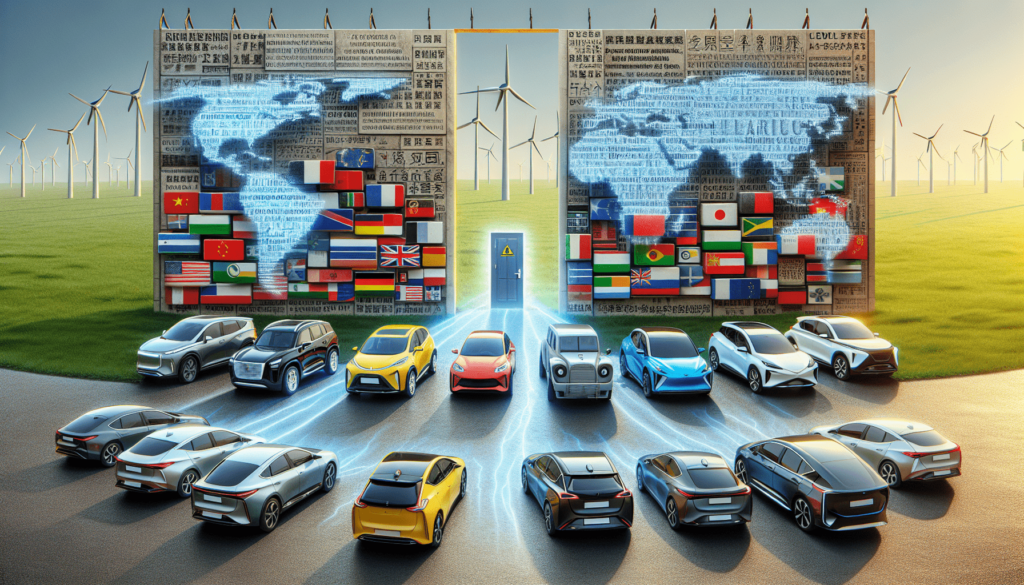Are you considering importing an electric vehicle? If so, you may be wondering whether there are any restrictions or regulations you need to be aware of. This article aims to provide you with a clear understanding of the potential limitations surrounding the importation of electric vehicles. From government policies to safety standards, there are a variety of factors that can impact your ability to bring an electric vehicle into your country. By examining these restrictions, you’ll be better equipped to make informed decisions and ensure a smooth import process. So, let’s explore the world of importing electric vehicles together!
Overview of Importing Electric Vehicles
Importing electric vehicles can be an exciting and beneficial endeavor, allowing you access to a wider range of cutting-edge clean transportation options from around the world. However, before embarking on this journey, it is crucial to understand the basics of importing electric vehicles, the benefits it brings, and the growing popularity of electric vehicles worldwide.
Understanding the Basics of Importing Electric Vehicles
Importing electric vehicles involves navigating a complex web of regulations, safety standards, and customs procedures. It requires a thorough understanding of international trade laws, import documentation, and compliance requirements. From obtaining proper certifications to adhering to specific battery regulations, several factors need to be considered.
Benefits of Importing Electric Vehicles
Importing electric vehicles offers numerous advantages. Firstly, it allows you to access a wider range of electric vehicle models that may not be available in your local market. This opens up possibilities for choosing vehicles tailored to your specific needs, such as long-range capabilities or advanced technology features.
Secondly, importing electric vehicles can contribute to reducing emissions and improving air quality in your region. Electric vehicles are known for their zero or low emission levels, making them an eco-friendly alternative to traditional combustion engine vehicles. By importing electric vehicles, you can actively participate in the global effort to combat climate change and promote sustainability.
Additionally, importing electric vehicles can stimulate market competition and drive innovation. It encourages automakers to continuously improve their electric vehicle offerings, leading to advancements in battery technology, range, and overall performance. This competition helps accelerate the transition to a cleaner and greener transportation sector worldwide.
Growing Popularity of Electric Vehicles Worldwide
Electric vehicles have gained significant popularity worldwide, with increasing adoption rates in both developed and emerging markets. Countries and individuals are recognizing the environmental and economic benefits of electric vehicles, leading to a surge in demand.
Governments across the globe are setting ambitious targets to reduce greenhouse gas emissions and combat climate change. Promoting electric vehicle adoption is a key strategy to achieve these goals. Consequently, many countries are implementing policies that incentivize electric vehicle imports and provide support for charging infrastructure development.
Furthermore, growing consumer awareness of the environmental impact of fossil fuel consumption has led to a shift in consumer preferences. The desire for sustainable and clean transportation options has contributed to the rising demand for electric vehicles. As a result, the electric vehicle market is experiencing rapid growth, with increased investments in research and development fueling technological advancements.
General Import Regulations
When importing electric vehicles, it is essential to familiarize yourself with the general import regulations that apply to all imported goods. These regulations encompass international trade laws and regulations, customs duties and taxes, as well as import documentation and procedures.
International Trade Laws and Regulations
International trade laws and regulations govern the movement of goods across borders. They ensure fair trade practices, protect intellectual property rights, and establish standards for product safety and quality. It is crucial to comply with these laws when importing electric vehicles to avoid any potential legal issues or barriers.
Customs Duties and Taxes
Importing electric vehicles often involves paying customs duties and taxes. These charges vary depending on the country and the specific vehicle being imported. Importers must be aware of the applicable rates and calculations to accurately estimate the total cost of importing electric vehicles.
Import Documentation and Procedures
Importing electric vehicles requires extensive documentation to comply with customs requirements and ensure a smooth importation process. This includes providing the necessary certificates of origin, bills of lading, and customs declarations. It is advisable to work closely with a customs broker or freight forwarder to navigate the complex paperwork involved in importing electric vehicles.

Country-Specific Import Restrictions
In addition to the general import regulations, each country has its own specific import restrictions and requirements for electric vehicles. Understanding these regulations is crucial for successful importation.
Import Regulations and Policies in the United States
The United States has regulations administered by several agencies, including the Environmental Protection Agency (EPA), National Highway Traffic Safety Administration (NHTSA), and the U.S. Customs and Border Protection (CBP). These agencies impose requirements related to emissions standards, crash testing, labeling, and compliance with safety regulations. Importers must adhere to these regulations to ensure the legal importation of electric vehicles into the country.
Import Restrictions and Requirements in the European Union
The European Union has harmonized regulations regarding electric vehicle imports. These regulations include safety standards, emissions limits, and technical requirements. Importers need to ensure that imported electric vehicles meet the EU’s standards and undergo the necessary conformity assessment procedures.
Import Policies and Procedures in Asia (China, Japan, South Korea, etc.)
Asian countries, such as China, Japan, and South Korea, have their own import regulations for electric vehicles. These countries are significant players in the electric vehicle market, and understanding their specific requirements is crucial for successful importation. These requirements can include safety certifications, labeling obligations, and conformity assessments.
Import Restrictions and Guidelines in Other Countries
Other countries also have their own import restrictions and guidelines for electric vehicles. It is essential to research and understand the specific regulations of the country you intend to import electric vehicles to. This includes compliance with safety standards, technical requirements, and any additional import duties or taxes.
Safety and Compliance Standards
Ensuring the safety and compliance of imported electric vehicles is of utmost importance. Electric vehicles must meet stringent safety standards, undergo testing and certification procedures, and adhere to environmental regulations and emission standards.
Safety Standards for Electric Vehicles
Electric vehicles must meet specific safety regulations to ensure the protection of occupants and other road users. These standards typically cover various aspects, such as crashworthiness, fire prevention, electrical system safety, and occupant protection. Compliance with these standards is vital to ensure the safe operation of imported electric vehicles.
Testing and Certification Requirements
Imported electric vehicles often need to undergo testing and certification procedures to verify their compliance with safety and environmental standards. These tests assess various aspects, including crash performance, battery safety, electrical system integrity, and emissions. Compliance with these requirements is typically mandatory prior to importation.
Environmental Regulations and Emission Standards
Electric vehicles are known for their low or zero emissions. However, they still need to comply with environmental regulations and emission standards set by regulatory bodies. These standards aim to limit the pollution caused by electric vehicles’ production, operation, and eventual disposal. Importers must ensure that the electric vehicles they import meet these environmental requirements and emission standards.
Conformity Assessment Procedures
Conformity assessment procedures are conducted to verify that imported electric vehicles conform to the applicable safety and technical requirements. These procedures include inspections, testing, and audits to validate compliance. It is essential to work with authorized conformity assessment bodies or laboratories to ensure that imported electric vehicles pass these assessments.

Battery Requirements
Electric vehicle batteries play a crucial role in their operation and safety. Importing electric vehicles involves understanding and adhering to specific regulations and requirements concerning lithium-ion batteries.
Regulations for Lithium-ion Batteries
Lithium-ion batteries, commonly used in electric vehicles, are subject to specific regulations due to their potential fire hazards and safety risks. These regulations address aspects such as packaging and labeling requirements, transportation restrictions, and storage guidelines. Importers must ensure compliance with these regulations to prevent accidents and ensure the safe transport and usage of lithium-ion batteries.
Transportation and Handling Regulations
Transporting and handling lithium-ion batteries require adherence to strict regulations. These regulations dictate practices to prevent short circuits, overheating, and potential fires. Proper packaging, secure transportation, and compliance with specific labeling requirements are essential to ensure safe transport and storage of electric vehicle batteries during importation.
Battery Safety Standards
Battery safety standards for electric vehicles aim to mitigate potential risks associated with battery technology. These standards cover aspects such as thermal management, battery cell capacity, and safety features to prevent overheating and thermal runaway. Adherence to these standards is crucial to ensure the safety of imported electric vehicles.
Recycling and Disposal Requirements
As the number of electric vehicles grows, proper battery recycling and disposal become essential. Importers must familiarize themselves with recycling and disposal requirements to ensure the responsible end-of-life management of electric vehicle batteries. Compliance with these regulations helps minimize environmental impact and promotes a sustainable electric vehicle industry.
Charging Infrastructure
The availability and compatibility of charging stations are crucial factors for the successful adoption of electric vehicles. Importing electric vehicles requires consideration of the existing charging infrastructure and any import restrictions on charging equipment.
Availability and Compatibility of Charging Stations
Before importing electric vehicles, it is essential to assess the availability and compatibility of charging stations in your region. Lack of charging infrastructure can hinder the widespread adoption of electric vehicles. Ensuring an adequate number of charging stations and their compatibility with imported electric vehicles is crucial for a seamless transition to electric transportation.
Import Restrictions on Charging Equipment
Certain countries may have import restrictions or guidelines regarding charging equipment. These restrictions may include certification requirements, compatibility standards, and safety regulations. Importers must ensure that the charging equipment they import complies with the applicable regulations of the destination country.
Building Infrastructure for Electric Vehicle Charging
In regions with limited charging infrastructure, importing electric vehicles can serve as a catalyst for developing robust charging networks. Governments and local authorities often provide support and incentives to drive the construction of charging infrastructure. Importers can actively participate in this development by collaborating with stakeholders and investing in charging stations.
Government Incentives and Support
Governments play a critical role in promoting the importation and adoption of electric vehicles. They offer various incentives, subsidies, tax credits, and support programs to encourage individuals and businesses to import and use electric vehicles.
Subsidies and Tax Credits for Electric Vehicle Imports
Many countries offer subsidies or tax credits to reduce the financial burden associated with importing electric vehicles. These incentives can significantly lower the purchase price and make electric vehicles more affordable. Importers should research and utilize these programs to maximize cost savings.
Government Grants and Funding Programs
Governments often provide grants and funding programs to support the growth of the electric vehicle industry. These grants may focus on research and development, charging infrastructure development, or initiatives to enhance consumer awareness and education. Importers can leverage these funding opportunities to contribute to the overall development of the electric vehicle market.
Import Tariff Exemptions
Some countries may provide import tariff exemptions or reductions for electric vehicles. These exemptions aim to promote the importation of electric vehicles and facilitate their market entry. Importers should explore these tariff benefits to further incentivize the importation of electric vehicles.
Support for Charging Infrastructure Development
Governments and local authorities understand the importance of charging infrastructure for electric vehicle adoption. They often provide financial support, grants, or subsidies for the installation of charging stations. Importers can take advantage of these programs to actively contribute to the development of the charging infrastructure in their region.
Local Laws and Regulations
When importing electric vehicles, it is crucial to understand the local laws and regulations that govern vehicle registration, homologation requirements, driving regulations, and parking restrictions.
Vehicle Registration and Homologation Requirements
Each country has its own vehicle registration and homologation requirements to ensure the imported electric vehicles meet local safety and technical standards. Importers should familiarize themselves with the registration process, the necessary documents, and any specific homologation requirements before importing electric vehicles.
Local Driving Regulations and Licensing
Local driving regulations and licensing requirements may differ when it comes to electric vehicles. Understanding these regulations, such as license plate restrictions, special permits, or driving restrictions, ensures compliance with the local laws and facilitates the smooth operation of imported electric vehicles.
Zoning and Parking Restrictions for Electric Vehicles
Some cities and regions implement zoning and parking restrictions for electric vehicles to incentivize their adoption and support charging infrastructure development. These restrictions may include priority parking spaces, access to certain zones, or exclusive incentives for electric vehicle owners. Importers should be aware of these restrictions and ensure they can fulfill any necessary requirements or obligations.
Importing Used Electric Vehicles
Importing used electric vehicles can offer cost savings and provide access to a wider range of vehicle options. However, there are specific considerations and procedures to follow when importing used electric vehicles.
Age and Mileage Restrictions
Certain countries impose age and mileage restrictions on imported used vehicles, including electric vehicles. These restrictions aim to control the importation of older, potentially less efficient vehicles. Importers must ensure that the used electric vehicles they intend to import meet the age and mileage criteria set by the destination country.
Battery Condition and Warranty
When importing used electric vehicles, the condition of the battery is crucial. The battery’s health and remaining capacity significantly impact the vehicle’s range and performance. Importers should closely inspect the battery condition and warranty of the used electric vehicles to ensure they meet their expectations and avoid unexpected costs.
Importation Procedures for Used Electric Vehicles
Importing used electric vehicles often requires following specific procedures and documentation requirements. These procedures typically include providing proof of prior ownership, a bill of sale, and a detailed inspection report. Importers must comply with these procedures to ensure a smooth importation process and meet the importation requirements of the destination country.
Future Trends and Developments
The future of electric vehicle importation encompasses a range of trends and developments that will continue to shape the industry and its associated regulations.
Harmonization of Electric Vehicle Import Standards
With the increasing global adoption of electric vehicles, there is a growing interest in harmonizing import standards. Harmonization aims to streamline the importation process, minimize trade barriers, and create a more uniform regulatory framework. Importers can anticipate future developments in harmonizing electric vehicle import standards, making the process more efficient and cost-effective.
Advancements in Battery Technology
Battery technology is constantly evolving, with advancements in capacity, charging speed, and overall performance. These advancements contribute to the increasing range and improved efficiency of electric vehicles. Importers can expect continued innovations in battery technology, leading to enhanced driving experiences and greater market competitiveness.
Integration of Electric Vehicles into Smart Grids
As the world progresses towards a smarter and more sustainable energy grid, the integration of electric vehicles becomes crucial. Smart grids offer opportunities for efficient charging, vehicle-to-grid integration, and optimization of energy usage. Importers can expect increased focus on the integration of electric vehicles into smart grids, enabling benefits such as grid stabilization, demand response, and renewable energy integration.
In conclusion, importing electric vehicles requires a comprehensive understanding of the basics, regulations, safety standards, and compliance requirements associated with electric vehicle importation. This comprehensive article has delved into various aspects such as general import regulations, country-specific import restrictions, safety and compliance standards, battery requirements, charging infrastructure, government incentives and support, local laws and regulations, importing used electric vehicles, as well as future trends and developments. By following these guidelines and remaining informed about the ever-changing landscape of electric vehicle importation, you can take full advantage of the benefits offered by electric vehicles and contribute to a cleaner and greener future.

